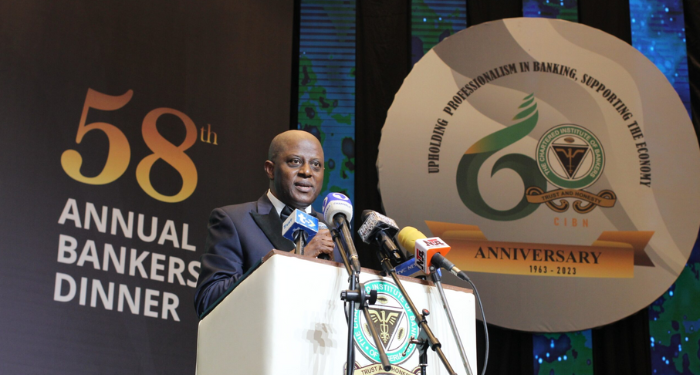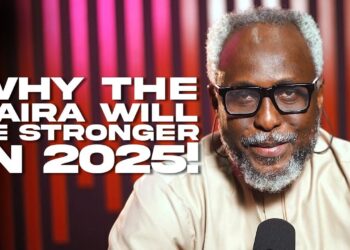The exchange rate between the naira and the dollar has depreciated to an all-time low, reaching N1,537.96/$1 at the official market.
This decline has occurred despite various policies implemented by the Central Bank aimed at halting the currency’s devaluation.
In the parallel market, where the naira is also traded, operators have reported to Nairametrics that the exchange rate has hit N1650/$1. However, they note that the actual rate could vary, potentially being lower or higher, depending on the availability of dollars.
An importer shared with Nairametrics that, in a bid to secure currency, he offered to purchase $1 million at a rate of N1,700/$1. Unfortunately, he was unable to procure the dollars, indicating that the supply of the currency is severely constrained.
CBN Policies not saving naira, yet?
The exchange rate has experienced a significant depreciation of 10% since the Central Bank initiated a series of foreign exchange reforms.
These reforms were designed to enhance the supply of foreign exchange while also reducing restrictions on demand.
As of January 31, following a directive from the Central Bank instructing banks to manage their net open positions, the exchange rate stood at N1,455/$1 in the official market but deteriorated to close at N1,577.9/$1.
This rapid depreciation indicates that the market might be skeptical about the effectiveness of the Central Bank’s forex policies, as an anticipated increase in forex inflows has not materialized.
In just the past two weeks, the Central Bank has released over six circulars and implemented policy actions aimed at further liberalizing the sector.
One of the most notable measures includes a move towards a market-driven exchange rate mechanism, which could potentially lead to the Naira being freely floated.
A circular from the Central Bank announced major changes, such as ending the limit on the spread between buy and sell rates in interbank foreign exchange transactions and removing restrictions on the sale of proceeds from interbank transactions.
The circular highlighted, “A key objective of the ongoing foreign exchange market reforms by the Central Bank of Nigeria is to promote a market-based price discovery system,” indicating a shift towards a more liberalized forex regime.
According to the new guidelines, forex transactions are to be conducted on a “Willing Buyer and Willing Seller” basis, which will allow more flexibility in exchange rates as they will be determined by market forces.
This approach is viewed as a significant step towards adopting a fully floating exchange rate system, where market dynamics are left to determine the rates.
Following the announcement of this policy, the exchange rate in the official market weakened from N1,469/$1 to N1,534/$1. Most recently, the Central Bank issued a circular directing banks to deposit travel allowances for personal and business use into customers’ debit cards instead of disbursing cash as previously practiced.
The policy initiated under the leadership of Godwin Emefiele at the Central Bank did not specifically require banks to make payments exclusively into debit cards.
The apex bank also targeted international oil and gas companies, amending guidelines on cash pooling of their forex inflows, stopping them from remitting 100% of their inflows.
On February 15th, the exchange rate closed at N1,498/$1 but reached an all-time intra-day high of N1607. By the end of the week, the rate had closed at N1,537.96/$1, with an intra-day peak of N1,631/$1.
Structural problems weighing down on exchange rate
The persistent depreciation of the naira, despite an increase in forex turnover in the official exchange window, is often attributed to the lack of forex inflow amid rising demand. This sentiment is widely echoed in social media discussions and television commentary.
The parallel market exchange rate surpassed N1000/$1 on October 9th, 2023, and the official market followed suit on December 8th, 2023, with the rate continuing to weaken thereafter.
In response to the depreciation last year, the Minister of Finance, Wale Edun, announced that Nigeria was expecting a $1 billion inflow, with a prospective $10 billion in foreign exchange anticipated in the near term, more specifically within weeks rather than months. This statement was made on October 24th, yet nearly four months later, no significant inflow has been recorded.
Nigeria’s external reserves have remained steady at $33 billion, despite World Bank projections suggesting a potential decline to $24 billion by the end of the year.
In the midst of these challenges, a significant observation was made by Yemi Cardoso during an interview on Arise TV two weeks ago. He highlighted that the stability of the Naira would depend on addressing the underlying economic issues such as inflation, economic growth, and increasing exports.
He emphasized that “The eventual stability of the Naira will be driven by our ability to address the fundamental issues affecting our economy…bring inflation under control and promote the growth of Nigerian businesses such that we eventually export much more than we consume as a nation.”
Recent data from the National Bureau of Statistics (NBS) reveals that Nigeria’s inflation rate climbed to 29.9% in February, underscoring the severe economic challenges the country faces.
It appears that without addressing these structural issues, forex policies may struggle to achieve the desired outcomes, including exchange rate stability.




















This government should go after economic saboteurs within and outside their ranks involved in fx racketeering and round tripping both now and in the past government. We also hear of billions of dollars in IMF loans missing during the last administration according to SERAP. The government should also stop sharing money to SMEs because it encourages corruption, rather they should provide the necessary conducive environment for businesses to thrive which also involves ending multiple taxation and harassment of businesses. In my opinion, the political will to go after or step on toes of connected culprits or offenders is all that is lacking in this worsening battle to shoreup the value of the naira.
And the CBN should stop pursuing this illusion of rates unification. You don’t float your currency when you have no arsenal to defend it’s value and your economy is largely import dependent.
This situation got this bad cos in one day the FMDQ moved closing rates from c.900 to 1384, in just one day all in the name of attempting unification.
For as long as the supply issues persists, the black market premium will remain, so trying to close it will only always make things worse.
If not for this attempted unification with no preparation, if official rates still was #460, i’m.sure street traders would still be trading below #1000, and diesel, rice, chicken, noodles etc would have been at least 33% cheaper, making life easier for tens of millions of Nigerians.
They should have built enough supplies in reserves that would help keep rates at #700-800 before ever attempting this shabby rates unification that is killing 100x more people than it’s ever benefitting.
What to do:
Look for $10-$20bn dollars and start intervening at critical sectors at #800-900 levels and bring back lots of the caps so that official rates go back below #1000..This way, even if the parallel rates don’t correct so much, at least it won’t get so worse so quickly again. And when a significant portionn of genuine demands is being met at discretionary rates, in a Sustainable manner, the street market rates will experience some.correction perhaps to the 1200 levels at least.
This rates unification policy is the worst the administration has come up with, and the FMDQ decision in late January has exacerbated the situation. These funny decided benefit less than 1% of the millions of people for which it causes severe hardhip. I wonder how these people sleep at night knowing their sub optimal policies are making lives unbearable for tens ofillions of people!!!!
Stop the rate speculation reporting as this do more harm to the rate than Demand and supply. This build fear and panic into the system as many people who doesn’t have anything to do with rate use this reporting to form decision. Let those who need Forex find out the rate when they want to buy and stop this information overload that’s killing the Naira. Perception matters. Let that be Nairametrics contribution to the Naira.
At the moment it’s all policy dogon turanchi and not action.
Criminalise and swing into swift action, without fail across status, class and political connection
– no (direct) transfer of foreign denominated currency from one Dom account to another
— A’s Dom dollar is converted to Naira and the Naira converted back to dollar in B’s Dom account
– Lagbaja, Karibu and Uche cannot withdraw their Dom directly. It must be converted and pay out in Naira
– Arrest without fail ANYONE collecting payment in foreign currency
— schools, O&G, stores …
– Arrest without fail everyone operating foreign currency in the open.
— these ‘hotspots’ are known in almost every town.
— in places like Lagos, close down the ‘hosting’ establishment like Airport hotel, Ikoyi hotel et Al
Obviously, in 9ja clime, the currency saga is multifaceted, a complex multidimensional reality. Nonetheless, the basics are #missing.
Let the actions back up and compliment the policies.
We’ll struggle in the immediate but adjust, positively, in the long term.
Long live the Federal Republic of Nigeria
The economic advicers should be smart enough to know when to get listed in the global market.
Must not be allowed to be pushed in to taking dumb decisions.
Because they have no clue of what direction the market is going hence, we got ourselves in this death trap attached to a flying monkey the ( $)USD.
This is just the beginning, with my forecast, I see #2000+ before a break in March.
The solution is very simple and it has nothing to do with the ordinary black market traders.
Source for experts, they are available .
I think if this new cbn governor can not stabilise exchange rate he and his colleagues should resign inflation is extremely too high
I will always be aware to work for stock market